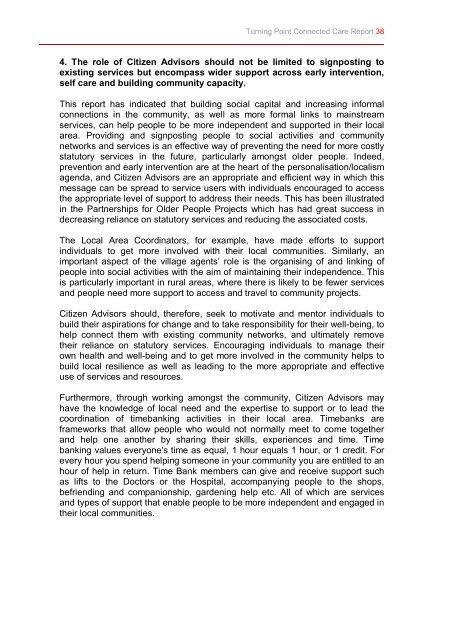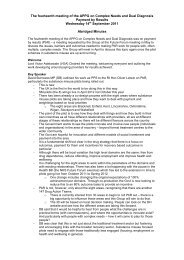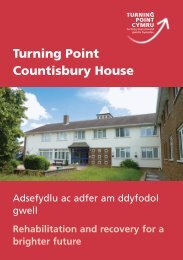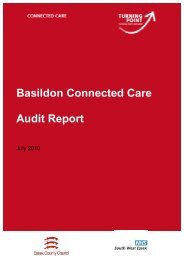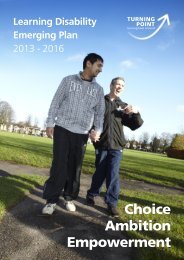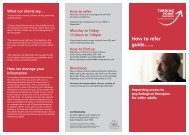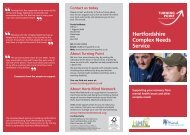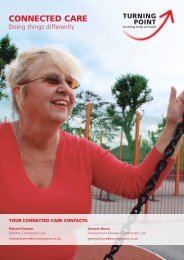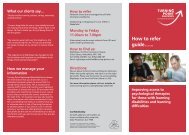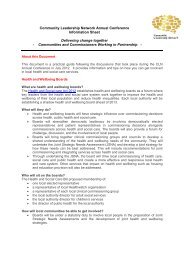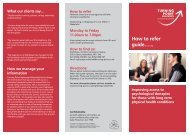Citizen Advisors - Turning Point
Citizen Advisors - Turning Point
Citizen Advisors - Turning Point
You also want an ePaper? Increase the reach of your titles
YUMPU automatically turns print PDFs into web optimized ePapers that Google loves.
<strong>Turning</strong> <strong>Point</strong> Connected Care Report 38<br />
4. The role of <strong>Citizen</strong> <strong>Advisors</strong> should not be limited to signposting to<br />
existing services but encompass wider support across early intervention,<br />
self care and building community capacity.<br />
This report has indicated that building social capital and increasing informal<br />
connections in the community, as well as more formal links to mainstream<br />
services, can help people to be more independent and supported in their local<br />
area. Providing and signposting people to social activities and community<br />
networks and services is an effective way of preventing the need for more costly<br />
statutory services in the future, particularly amongst older people. Indeed,<br />
prevention and early intervention are at the heart of the personalisation/localism<br />
agenda, and <strong>Citizen</strong> <strong>Advisors</strong> are an appropriate and efficient way in which this<br />
message can be spread to service users with individuals encouraged to access<br />
the appropriate level of support to address their needs. This has been illustrated<br />
in the Partnerships for Older People Projects which has had great success in<br />
decreasing reliance on statutory services and reducing the associated costs.<br />
The Local Area Coordinators, for example, have made efforts to support<br />
individuals to get more involved with their local communities. Similarly, an<br />
important aspect of the village agents’ role is the organising of and linking of<br />
people into social activities with the aim of maintaining their independence. This<br />
is particularly important in rural areas, where there is likely to be fewer services<br />
and people need more support to access and travel to community projects.<br />
<strong>Citizen</strong> <strong>Advisors</strong> should, therefore, seek to motivate and mentor individuals to<br />
build their aspirations for change and to take responsibility for their well-being, to<br />
help connect them with existing community networks, and ultimately remove<br />
their reliance on statutory services. Encouraging individuals to manage their<br />
own health and well-being and to get more involved in the community helps to<br />
build local resilience as well as leading to the more appropriate and effective<br />
use of services and resources.<br />
Furthermore, through working amongst the community, <strong>Citizen</strong> <strong>Advisors</strong> may<br />
have the knowledge of local need and the expertise to support or to lead the<br />
coordination of timebanking activities in their local area. Timebanks are<br />
frameworks that allow people who would not normally meet to come together<br />
and help one another by sharing their skills, experiences and time. Time<br />
banking values everyone's time as equal, 1 hour equals 1 hour, or 1 credit. For<br />
every hour you spend helping someone in your community you are entitled to an<br />
hour of help in return. Time Bank members can give and receive support such<br />
as lifts to the Doctors or the Hospital, accompanying people to the shops,<br />
befriending and companionship, gardening help etc. All of which are services<br />
and types of support that enable people to be more independent and engaged in<br />
their local communities.


